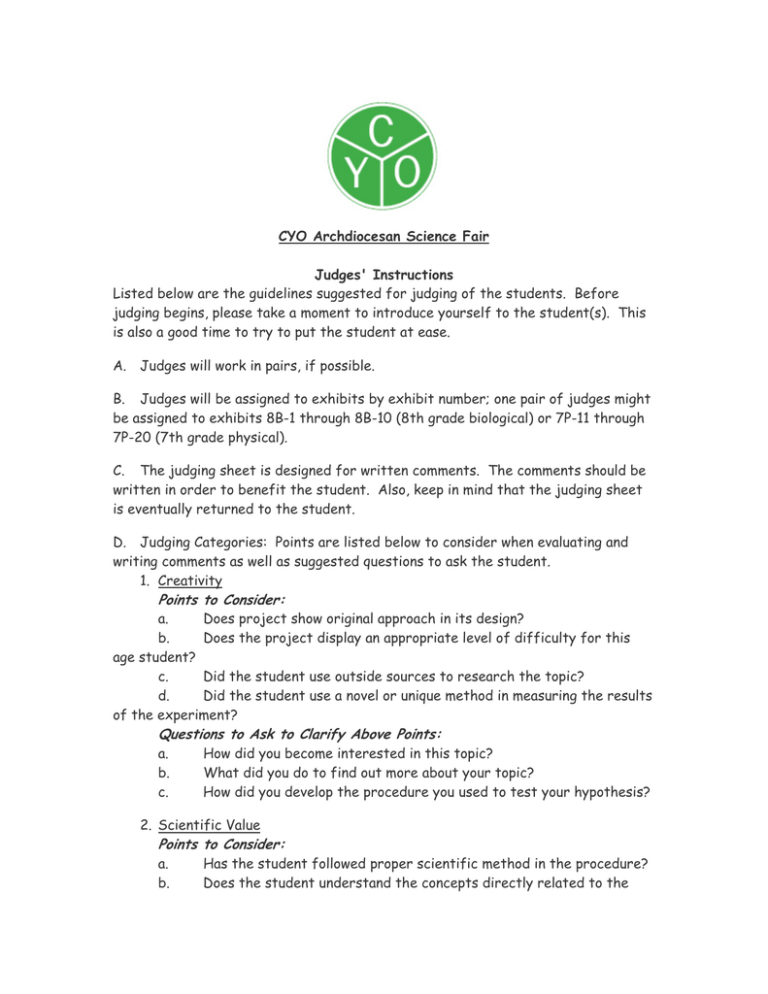Points to Consider: Questions to Ask to Clarify Above Points: Points
advertisement

CYO Archdiocesan Science Fair Judges' Instructions Listed below are the guidelines suggested for judging of the students. Before judging begins, please take a moment to introduce yourself to the student(s). This is also a good time to try to put the student at ease. A. Judges will work in pairs, if possible. B. Judges will be assigned to exhibits by exhibit number; one pair of judges might be assigned to exhibits 8B-1 through 8B-10 (8th grade biological) or 7P-11 through 7P-20 (7th grade physical). C. The judging sheet is designed for written comments. The comments should be written in order to benefit the student. Also, keep in mind that the judging sheet is eventually returned to the student. D. Judging Categories: Points are listed below to consider when evaluating and writing comments as well as suggested questions to ask the student. 1. Creativity Points to Consider: a. Does project show original approach in its design? b. Does the project display an appropriate level of difficulty for this age student? c. Did the student use outside sources to research the topic? d. Did the student use a novel or unique method in measuring the results of the experiment? Questions to Ask to Clarify Above Points: a. b. c. How did you become interested in this topic? What did you do to find out more about your topic? How did you develop the procedure you used to test your hypothesis? 2. Scientific Value Points to Consider: a. b. Has the student followed proper scientific method in the procedure? Does the student understand the concepts directly related to the c. d. project? Can the student identify any practical applications for the project? Is the conclusion logically supported by the results? Questions to Ask to Clarify Above Points: a. b. c. Why do you think the results came out this way? If you were to do this project over, how would you improve or expand it? How can people use what you have learned from this project? 3. Knowledge & Development Points to Consider: a. b. c. d. Did the student give a clear explanation of the procedure? Is the student dependent on notes or memorized explanations? Did the student answer all questions clearly? Did the student speak in a confident manner? a. Ask any questions critical to clarifying procedure, results or conclusion. Questions to Ask to Clarify Above Points: 4. Neatness & Organization of Exhibit Points to Consider: a. b. c. d. Does the display show careful workmanship in construction? Is the display attractive and eye catching? Is the display logically organized using the scientific method? Do tables and graphs accurately reflect the results? a. b. Ask questions regarding any construction aspects. Ask questions about tables and graphs. Questions to Ask to Clarify Above Points: E. Scoring: Based on a 1-2-3-4 scale for each of the categories listed above. The highest score is "1", the lowest is "4". Judges should understand this clearly, because a reversal of the point scale could be disastrous. Scores should be marked by each judge, according to this scale, for the round and the category shown on the sheet. Important Notice - Regarding Scoring Under the scoring area of the judging sheet there is a box near the left margin of the sheet. If an exhibit is, in the opinion of the judges in round one, worthy of further consideration in the second round of judging, an "X" should be placed in this box. This would apply, regardless of score, for one or not more than two of the exhibits handled by any pair of judges. Of course, the judges may also come to the conclusion that none of their exhibits are worthy of further consideration. Under no circumstances should you place an "X" in this box on more than two sheets before clearing it with a staff member. Because one pair of judges or one judge, might score differently from another, the score is not important, if the exhibit still is worthy of further consideration. However, in most cases judging is consistent and the lowest scores normally are reflected in the final awards. Prior to leaving the student and exhibit, please compliment and encourage the student on future pursuit of education. If the project should be developed further, please recommend this to the student. Following the completion of round one, those exhibits involved in the second round of judging will be announced. Those exhibitors will be asked to remain and all others will be excused from the auditorium until the conclusion of the second round of judging. Those judges interested in participating in the second round of judging should contact a staff member.